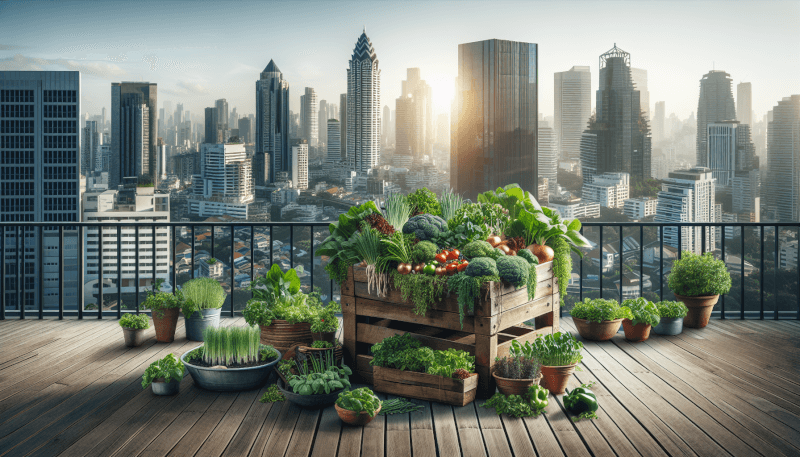Are you interested in growing your own organic produce but live in a city with limited space? Look no further! This article provides urban gardening tips that will help you cultivate a thriving garden in the concrete jungle. Discover innovative ways to utilize small spaces, choose the right plants for urban environments, and maintain a sustainable and eco-friendly garden. Whether you have a tiny balcony or a rooftop terrace, these tips will ensure you enjoy the satisfaction of growing your own organic fruits, vegetables, and herbs right in the heart of the city.
Choosing the Right Location
Choosing the right location for your urban garden is crucial for its success. One of the first considerations is assessing sunlight exposure. Look for a spot in your yard or on your balcony that receives at least six hours of direct sunlight each day. This will ensure that your plants have enough light to grow and thrive.
If you have limited space, there are still options for creating a garden. Considerations for small spaces include utilizing vertical gardening techniques. You can use trellises or hanging containers to maximize your growing area. Additionally, balcony gardens or rooftop gardens are perfect for small spaces, as they make use of otherwise unused areas.
Another option for finding a suitable gardening location is community gardens. Many cities have community garden plots that you can rent or join. This not only provides you with a dedicated space for gardening but also allows you to connect with other gardeners in your community.
Preparing the Soil
Preparing the soil is an essential step in creating a productive urban garden. Begin by testing the soil quality. You can purchase a soil testing kit or send a sample to a local agricultural extension office for analysis. This will help you determine the pH level, nutrient content, and any necessary amendments.
Improving soil fertility is often necessary in urban environments, as the soil may be compacted or lacking in essential nutrients. Adding organic matter such as compost or well-rotted manure can help enrich the soil and promote healthy plant growth. It is also important to aerate the soil by loosening it regularly with a garden fork or tiller.
Creating raised beds is another option for urban gardeners, particularly if you are working with poor-quality soil. Raised beds allow you to control the soil composition and drainage while also reducing the risk of weeds. You can construct raised beds using untreated lumber, bricks, or even recycled materials such as old pallets.

Container Gardening
Container gardening is a popular choice for urban gardeners who have limited space or lack access to suitable planting areas. When selecting containers, consider the size of the plant’s root system and make sure it has enough room to grow. The containers should also have drainage holes to prevent waterlogging.
Choosing the appropriate potting mix is key to the success of your container garden. Opt for a high-quality potting mix that is lightweight, well-draining, and nutrient-rich. Avoid using garden soil in containers, as it tends to be too heavy and can lead to poor drainage.
Maintaining container gardens involves regular watering, as containers can dry out quickly, especially during hot summer months. Check the moisture level of the soil regularly and water when it feels dry to the touch. Fertilize container plants with a slow-release organic fertilizer or use compost tea to provide nutrients throughout the growing season.
Selecting the Right Plants
Choosing plants suitable for urban environments is essential, as they need to thrive in limited space and potentially adverse conditions. Consider plants that tolerate heat and drought, as urban areas tend to have higher temperatures and less access to water. Some suitable options include tomatoes, peppers, herbs like basil and rosemary, and succulent plants like jade or aloe vera.
For small spaces, focus on growing vegetables, fruits, and herbs that are well-suited to container gardening. Compact varieties of tomatoes, strawberries, and herbs like chives or thyme are excellent choices. Additionally, consider vertical gardening techniques such as growing vine plants like cucumbers or peas on trellises or using hanging baskets for strawberries or herbs.
When cultivating an urban garden, it’s also important to consider the height of plants. Taller plants can create shade, which may limit the sunlight available to other plants. Be mindful of plant placement and ensure that shorter plants are not overshadowed by taller ones.

Watering and Irrigation
Determining water requirements for your urban garden is crucial to maintain healthy plants. Factors such as temperature, humidity, and plant types will affect water needs. Generally, most plants require around one inch of water per week. However, be mindful not to overwater, as excessive moisture can lead to root rot and other issues.
Using efficient watering techniques is essential for conservation and reducing water waste. Consider using a soaker hose or drip irrigation system, as they deliver water directly to the base of your plants’ roots, minimizing evaporation and runoff. Mulching around your plants can also help retain moisture in the soil.
Setting up an irrigation system can be beneficial, particularly if you have a large or complex urban garden. Options range from simple timers connected to a hose or sprinkler system to more advanced drip irrigation systems connected to a central water source. Choose the system that best fits your needs, budget, and the size of your garden.
Managing Pests and Diseases
Urban gardens are not exempt from pest and disease issues, but there are ways to manage them effectively. Start by identifying common urban pests that could potentially affect your garden. Common culprits include aphids, snails, slugs, and caterpillars. Look out for signs such as chewed leaves, sticky residues, or visible insects.
Preventing pest infestations should be a priority in urban gardening. Implementing cultural practices, such as crop rotation and cleaning up garden debris, can reduce the likelihood of pests. Additionally, practicing good hygiene, such as washing gardening tools after use, can prevent the spread of diseases.
Using organic pest control methods is ideal for those looking to grow organic produce. Natural options include introducing beneficial insects like ladybugs or lacewings, using insecticidal soaps or neem oil, and creating physical barriers such as netting or row covers. Integrated pest management strategies that combine multiple approaches can be highly effective.

Composting and Fertilizing
Creating compost at home is a sustainable way to provide your garden with nutrient-rich soil amendments. Start by collecting kitchen scraps, such as fruit and vegetable peels, coffee grounds, and eggshells. Avoid adding meat, dairy, or oily foods, as they can attract pests. Layer the kitchen scraps with yard waste like leaves or grass clippings, and periodically turn the pile to promote decomposition.
Using compost to nourish plants is a great way to reduce reliance on synthetic fertilizers. Spread a layer of compost on top of the soil or mix it into the existing soil before planting. Compost improves soil structure, retains moisture, and provides a slow-release source of nutrients, promoting overall plant health.
Natural fertilizers are another option for organic gardening. Examples include fish emulsion, seaweed extract, and bone or blood meal. These organic fertilizers can be purchased or made at home. They provide essential nutrients to plants and help improve soil fertility.
Monitoring and Maintenance
Regularly inspecting plants is an important part of urban gardening. Look for signs of stress or disease, such as yellowing leaves, wilting, or unusual spots. Early detection allows for prompt action, which can prevent further damage or the spread of pests.
Pruning and trimming techniques are necessary to maintain the health and shape of your plants. Remove dead or damaged branches, and thin out crowded areas to improve airflow and reduce the risk of diseases. Be sure to use clean and sharp pruners to prevent the spread of pathogens.
Weed control strategies are essential, as weeds can compete with your plants for nutrients, water, and sunlight. Regularly pull out weeds by hand or use a hoe to remove them, making sure to get rid of the roots. Mulching around your plants can also help suppress weed growth and aid in moisture retention.

Harvesting and Storage
Determining the right time to harvest is critical to achieving optimal flavor and nutritional value. Different plants have different signs of maturity, such as changing colors or firmness. Refer to seed packets or gardening guides for guidance on when to harvest specific vegetables, fruits, or herbs. Taste-testing can also help determine if the produce is ready for harvest.
Proper handling and storage of produce is essential to maintain freshness and prevent spoilage. Thoroughly wash harvested fruits and vegetables before storing them in a cool, dry place. Some crops, like root vegetables or winter squash, can be stored for extended periods. Others, like leafy greens or berries, are best consumed shortly after harvest.
Preserving excess harvest is a great way to enjoy your produce throughout the year. Options for preservation include canning, freezing, or dehydrating. Each method has its specific advantages, so choose the one that suits your needs and available resources.
Community Engagement
Participating in local gardening communities is a fantastic way to connect with other urban gardeners and gain valuable knowledge and support. Look for local gardening clubs, community gardens, or workshops that focus on urban gardening. Joining these groups allows you to share experiences, swap seeds or plants, and learn from experienced gardeners.
Sharing knowledge and resources is an essential aspect of community engagement in urban gardening. If you have expertise in a particular gardening technique or have extra seeds or plants, consider hosting workshops or sharing them with fellow gardeners. By sharing and exchanging resources, you contribute to a vibrant and sustainable urban gardening community.
Contributing to urban greening initiatives is a way to make a broader impact in your city. Get involved in local projects that focus on beautifying public spaces or creating urban gardens in underserved areas. By working together with others, you can help create a greener, more sustainable urban environment for everyone to enjoy.


